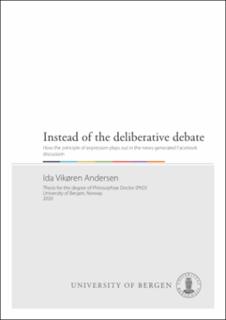| dc.description.abstract | Social media have become an integrated part of people’s lives and are important communication channels, utilised both for personal communication and public debate. Several studies and theories suggest how the advent of social media impacts the public sphere and the rhetoric embedded in it. Still, we have limited knowledge about how the social network site Facebook facilitates and is utilised for public debate. This study explores utterances and modes of interaction, as well as the contextual frames that make possible and constrain these, in the news-generated social media debates about immigration in the three Scandinavian nations. The study asks the question: What characterises the rhetorical strategies in the news-generated social media debates about the immigration issue? The dissertation is a contribution to the already vast and rapidly growing literature that examines digital technology’s influence on political debate and the public sphere. The study’s contribution to this literature is its rhetorical approach, which implies an orientation to the texts in the debates, rather than the users’ experiences of them. Furthermore, it entails an approach to the texts as rhetorical moves in the debates that structure and interact with each other, and that are structured by and interact with the context in which they are embedded. Theoretically, the study combines perspectives on public debate articulated in the rhetorical tradition and deliberative democracy theory, with a variety of theoretical frameworks and concepts that, in various ways, shed light on social media as discursive arenas. In addition to arenas for political debate and opinion formation, social media are discussed as arenas for vernacular rhetoric and everyday talk, personal and individualised political engagement, epideictic rhetoric, as well as flaming and hostility. The dissertation’s main contribution is a comprehensive study of the rhetorical expressions and modes of interaction, examined against the backdrop of the contextual frames of the debates. Where many earlier studies have produced valuable insights into people’s experiences of these debates, the knowledge produced through close examination of the debates offers new ways to understand why people experience these debate arenas as they do. Through two separate parts, the analysis explores both what types of rhetorical expressions and forms of interaction are made possible by the contextual frames, and what rhetorical expressions and modes of interaction, in turn, prevail in the debates. The two chapters in the first part demonstrate how both the medium and the issue facilitate a debate characterised by personal engagement and expression, strong emotions and conflict, as well as the fusion of many different rhetorical practices and genre conventions. Through the four thematically separated chapters in the second part, the analysis demonstrates how the debates are characterised by 1) subjective and “authentic” expressions, rather than debate between conflicting views; 2) epideictic struggles over moral positions, where acts of re-definition, re-evaluation, and re-positioning dominate; 3) expression competitions, in which participants compete in performing the most savage attack on the opponent in order to secure the final say for oneself and, thereby, safeguard one’s authentic expression, and; 4) continuous negotiations of genre conventions and debate norms, whereby two contradictory, yet concurrent, debate ideals manifest themselves. These two ideals are the principle of deliberation, according to which participants should approach each other through argumentation, and the principle of expression, according to which argumentation is illegitimate, as it obstructs the individual from expressing his or her authentic self. As such, the analysis demonstrates how the debates are not characterised primarily by argumentation, but rather a variety of other modes of interaction and rhetorical expressions. Thereby, the dissertation offers new ways to describe the scope and functions of public debates in digital environments that consider the fusion of different practices, many of them not captured by an emphasis on political rhetoric and deliberation alone. In particular, by introducing the “principle of expression”, the dissertation offers a way to describe a particular characteristic of these debates that enable us to better understand why and when these arenas fail to facilitate argumentation, what causes an aggressive tone, and why they, by many, are experienced as particularly hostile environments. | en_US |
